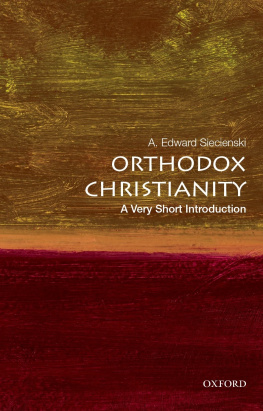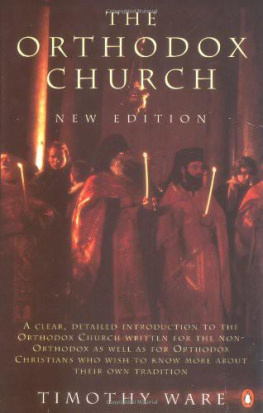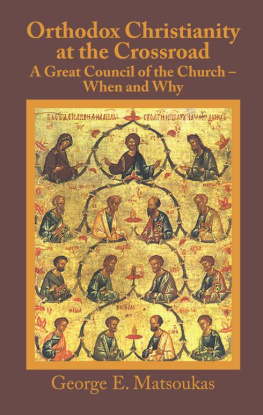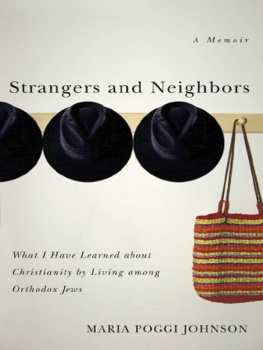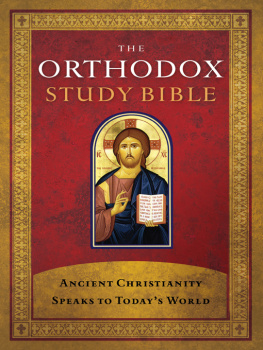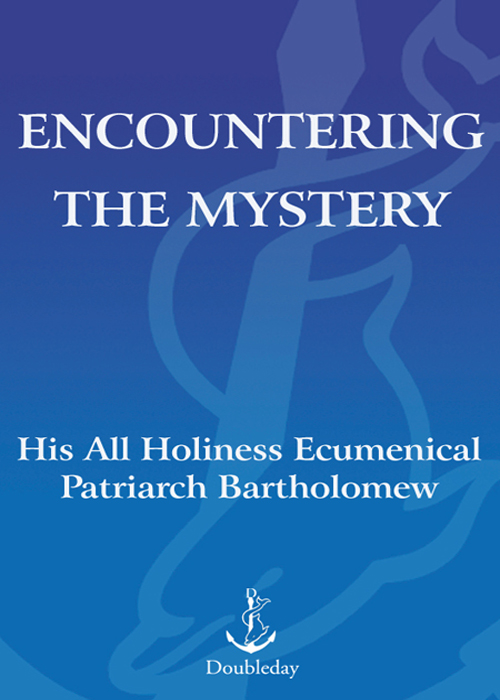
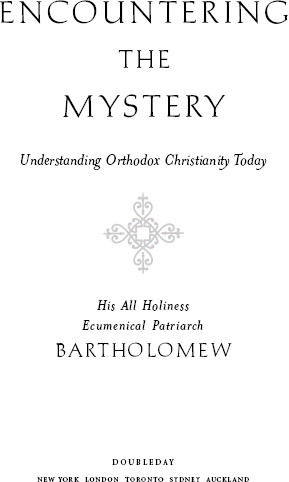
CONTENTS
I.
HISTORICAL PERSPECTIVES
The Orthodox Church and the Ecumenical Patriarchate
II.
SONG AND SPACE
Art, Architecture, and Liturgy
III.
THE GIFT OF THEOLOGY
Basic Principles and Perspectives
IV.
VOCATION OF LOVE
Monasticism as Choice and Calling
V.
SPIRITUALITY AND SACRAMENTS
Prayer and the Spiritual Life
VI.
THE WONDER OF CREATION
Religion and Ecology
VII.
FAITH AND FREEDOM
Conscience and Human Rights
VIII.
TRANSFORMING THE WORLD
i. Social Justice: Poverty and Globalization
EPILOGUE
The Hope That Lies Within
FOREWORD
To be myself, I need you.
If we do not look one another in the eye,
we are not truly human.
ECUMENICAL PATRIARCH BARTHOLOMEW1
NOT THEORY, NOT PHILOSOPHY, BUT EXPERIENCE
His All Holiness the Ecumenical Patriarch Bartholomew, elected to the See of Constantinople in autumn 1991, is chiefly known to the public for his urgent and courageous statements concerning the present-day ecological crisis. No other church leader has given such emphatic priority to environmental issues, and with good reason he has been called the Green Patriarch.2 He is also greatly respected for his commitment to dialogue with other Christians, especially with the Roman Catholic Church, and for his openness to Judaism and Islam. Truly, throughout the sixteen years of his service as leader of the worldwide Orthodox communion, he has striven tirelessly to act as bridge builder.
In the present volume, while having much to say about ecology and dialogue, the Patriarch is concerned to place these two issues in the broader context of Orthodox faith and life as a whole. He does not attempt, however, to provide a systematic and exhaustive account of Orthodox spirituality. That is not his way. He concentrates rather upon the themes that are closest to his heart in his ministry as Patriarch. As the reader of these pages will quickly discover, he speaks with a voice that is gentle yet firm, humble yet authoritative. Above all, his standpoint is compassionate and pastoral.
A great Serbian bishop of the twentieth century, Saint Nikolai Velimirovc, has written: Our religion is founded on spiritual experience, seen and heard as surely as any physical fact in this world. Not theory, not philosophy, not human emotions, but experience.3 Such also is the approach of the Ecumenical Patriarch. Stressing what he terms the equal importance of creed and experience, he says:
Orthodox Christianity is a way of life in which there is a profound and direct relationship between dogma and praxis, faith and life. This unity of faith and life means that the reality of the eternal truths lies in their experiential power, rather than in their codification into a set of ideological constructs.4
Summing up this experiential stance, Bartholomew states epigrammatically:
Truth is beheld; it is not understood intellectually. God is seen; He is not examined theoretically. Beauty is perceived; it is not speculated about abstractly.5
In the present book, the Patriarch remains faithful to this point of view. His words are based not on speculation or academic researchalthough he holds a theological doctoratebut on his lived experience. It is significant that he illustrates his discussions with personal reminiscences, recalling such moments as prayers in his childhood with his mother, church services on his native island of Imvros, worship as a student at the Patriarchal Theological School of Halki, and the nightly celebration of Compline in the little chapel beside his apartment in the Phanar. Doctrine and life go hand in hand.
There are two main aspects to the Patriarchs spiritual experience, as Deacon John Chryssavgis indicates in his Biographical Note. First, there is the traditional Orthodox piety acquired in his early years on Imvros, and reinforced by his time on Halki. Second, there is the more wide-ranging awareness that he has gained through his postgraduate studies in the West at Rome, Bossey, and Munich, through his two decades as private secretary to his predecessor, Patriarch Demetrios, and through his continual journeys abroad since his accession to the Patriarchal Throne (for he is an indefatigable traveler). The first of these two things has given him depth, and the second breadth. Together, the two have made him into what he is: a builder of bridges, an opener of doors.
A single master theme binds together everything Patriarch Bartholomew has to say in the pages that follow, and that is his insistence on the value of the human person. As he affirms in the opening chapter, Each human person isuniquely created in the image of God, never able to be reduced to anything less than a mystery. Characteristically, in words addressed to an environmental symposium in the United States, when singling out what are in his opinion three particular strengths of Orthodox Christianity most relevant to the world we live in today, he begins by speaking about the person:
The first strength is Orthodox Christianitys conception of the human being as person. For us, personhood is an ontological category of being. This theological thinking is deeply rooted in our tradition which understands God as a Trinitya community of persons.6
The Patriarchs personalism, it should be added at once, is not merely theoretical, but expresses itself in a down-to-earth and practical manner. He has a gift for friendship, and not least for friendship with children. He has the ability to establish immediate contact with those whom he meets, and he has an excellent memory for faces and names.
There are four leading features in the Patriarchs understanding of the person: mystery, freedom, relationship, wholeness.
MYSTERY
[N]ever able to be reduced to anything less than a mystery: here is the first distinguishing mark of personhood that Bartholomew is concerned to uphold. Developing the point, he goes on to say in the present work: The human person can never be definedit can never be exhaustively or exclusively contained in any single aspect or description the most that we can do is to provide an ostensive perception. We can point, that is to say, to what is signified by being a person, we can give illustrations and examples, but that is all. Since it is indefinable, personhood is by the same token irreducible. The mystery of the fact of being a person cannot be reduced to the facts of the relevant sciences, such as physiology, psychology, or sociology. There is always something more, not to be adequately expressed in words, for the reality of being a person is far greater than any explanation that we choose to give of it. It is an intrinsic hallmark of personalness to be open, always to point beyond. This means that we have no clear conception of the limits of our personhood, of the possibilities as yet latent in our personalness, and of the ultimate fulfillment of being a person. In the words of Saint John the Theologian: What we are to be in the future has not yet been revealed to us (1 John 3:2).
As Saint Gregory of Nyssa points out, there is a specific reason for the mysterious and unfathomable character of the human person.7 This lies in the fact that, as the Patriarch points out more than once, we are formed in the image and likeness of God (Gen. 1:26). Now, an image, if it is to be truly such (as Saint Gregory points out), needs to reproduce the attributes of its archetype. Since God, our archetype, is beyond comprehension, so also, albeit on a different level, is His image the human person. To counterbalance our apophatic theology, we have need to develop also an apophatic anthropology. The heart is deep (Ps. 64:6).
Next page

